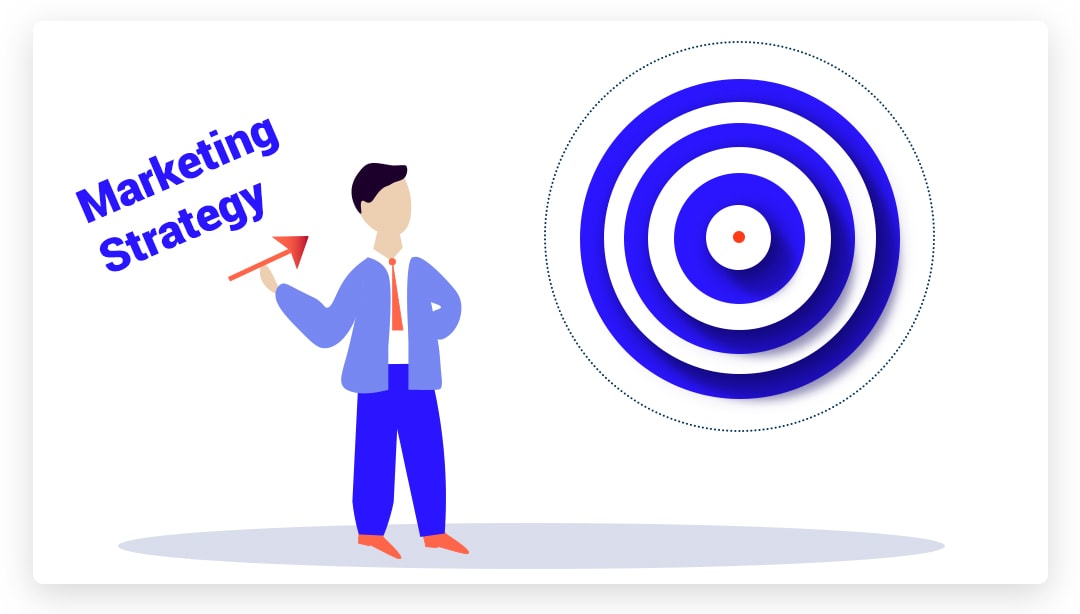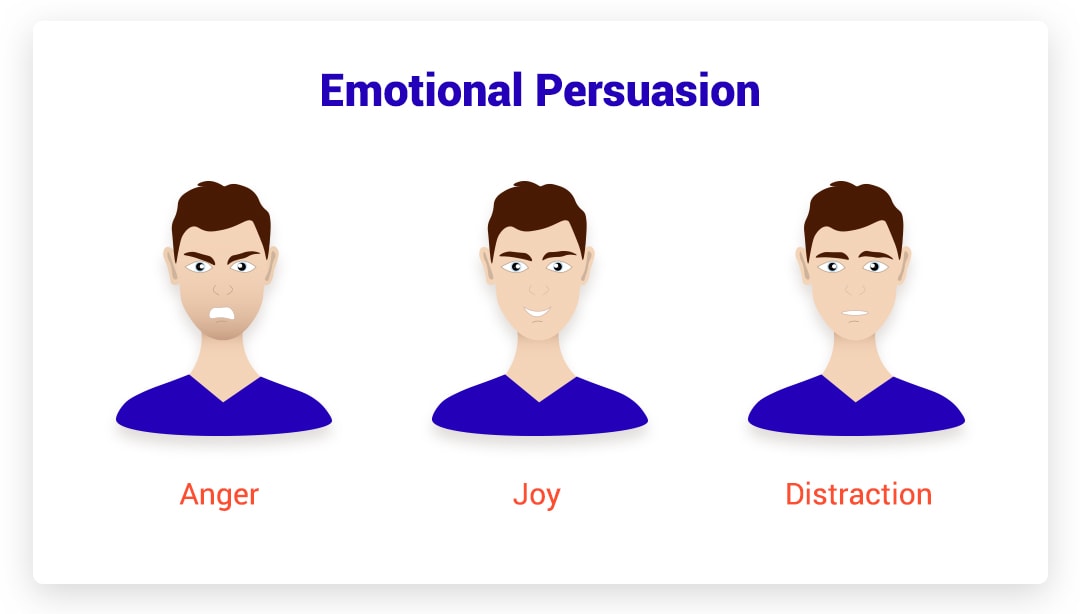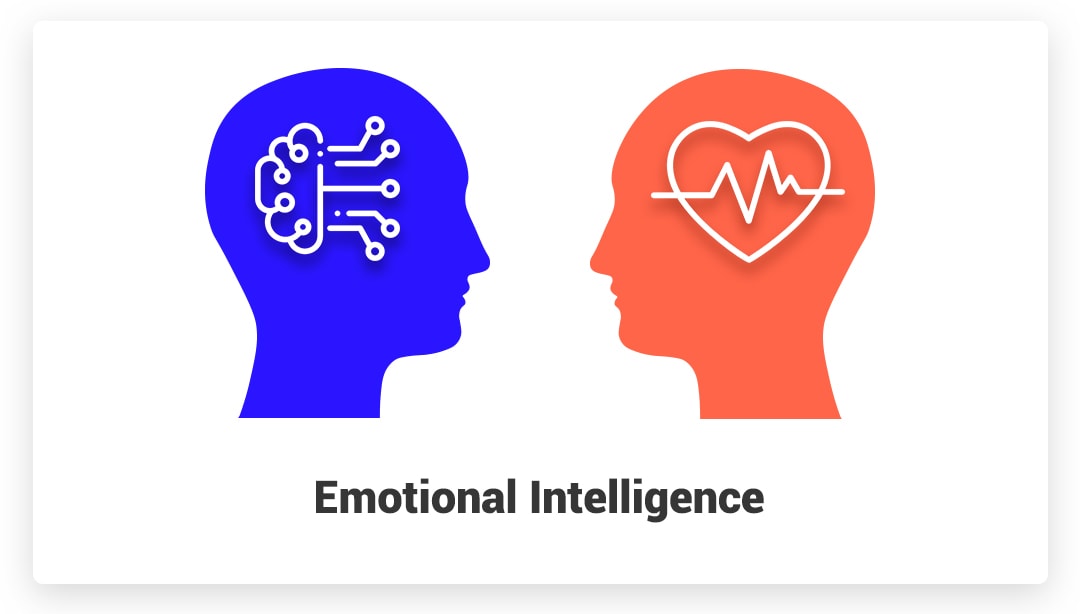
Most marketing strategies pursue the goal of convincing people to purchase a good or a service. Advertisements are full of top tips on how to use products, promises of an unbelievable jump in efficiency, as well as other valuable features that are highlighted. We try to make everyone believe that we use logic in decision-making processes. But is it really like that? Do we really rely on the logic, or are we more likely to react to someone’s appeal to emotions?
Content:
- Is Emotional Persuasion Really Important?
- Emotional Persuasion: What You Should Be Aware of
- 4 Knights of Emotional Persuasion
- How to Become a Guru in Emotional Persuasion
- Final Thoughts

Try to analyze what makes customers come to your website and spend money on your products and services. Of course, in many cases, it is a real need that drives consumers to purchase. However, we also know about thousands and thousands of choices that are made because of an unexplained emotional desire. Harnessing this desire is a great engine for increasing your sales. Emotional appeal plays a key role in this process, so we decided to devote our research and this article to the topic of emotional persuasion and how to use it to grow your business.
Is Emotional Persuasion Really Important?
Of course, during our research, we encountered some opposite views. This is why we would like to start our discussion with the following facts:
- Free Products are a Persuasive Factor
These experiments conducted by a global eCommerce company showed that people are more likely to get a product for free than to pay a symbolic price for it.
- A Lower Price is More Appealing
There is a higher possibility that a person would buy a cheaper product of lower quality than a better one. As you can see, those points have no rational explanation. These are the examples of persuasion. At the same time, there may be a lot of other factors that impact the customer’s choice. What we would like to underline is that they are not always rational. Even if we try to persuade ourselves that we base our decisions on logical thinking, emotions are quite powerful factors that we depend on. There is even a whole Persuasion 101 book devoted to this topic, so check it out to expand your expertise.
Emotional Persuasion: What You Should Be Aware of
Our mind consists of 2 systems, as follows:
- System 1
System 1 is responsible for emotional processing. It is fast and responds to external information automatically. Researchers say that System 1 operates with the default processes and evolutionarily appeared before System 2.
- System 2
System 2 is completely under our control. This is the reason its operations require effort (unlike System 1, which operates immediately and effortlessly). Besides that, this system works slower and is based on the rules defined by one’s education, worldview, knowledge, etc.
The point is, System 2 requires our full focus. Meanwhile, System 1 operates without us even realizing that some processes occur. Just imagine one situation. You work on a complicated task all day long. Your mental activity is on maximum for a couple of hours, and then you feel exhausted. This means that your System 2 requires extra efforts that cost you your resources.

On the other hand, your System 1 works 24/7 without you even noticing this. You make decisions based on emotions in a hassle-free way. Such decisions do not take any extra time or effort.
We would like to present you with a casual persuasion example you may encounter. Suppose you make an expensive purchase. You like it, but at the same time, you do not clearly understand why you have bought it. Time goes by and you start worrying it was a mistake to buy such an expensive product. However, a few hours later, your brain gives you the reasons for your decision. It provides you with the proof that it was right to choose this product, so you feel more confident in your decision.
In fact, your emotional System 1 was the initiator of your purchase. And System 2 turned on only after some time when you found the advantages of your purchase. The systems influenced one another to reach the needed result: satisfaction. And they were quite successful at it. So, the decision was made not on the basis of the rational persuasion but because of emotions.
4 Knights of Emotional Persuasion
What is persuasion? It is the way to make people do something or believe in certain things. This is exactly what marketing specialists try to do when designing the business strategy.
No matter whether you are working in the eCommerce industry, selling goods, or providing any services online, you pursue one single aim just like any other business owner. It is always about making a profit, isn’t it?
Persuasion techniques can help you attract more consumers. And now, when you know about how Systems 1 and 2 work and interact, you can implement brand-new strategies and tactics for your business.
In fact, every emotion can impact the decision-making process. However, some emotions are weaker, and others are more powerful. By applying a certain persuasive methodology, you can evoke one of the key emotions and achieve the desired result. So, what emotions impact a person’s choices the most?
- Sadness as the Emotion to Start with
If the content of your website makes a person feel sad, it may be either useful or useless for you. Take into account the following peculiarities:
- a sad person makes decisions slower than a happy one,
- the decision gets harder to make because of this emotion,
- sadness leads people to underestimate their own capabilities and opportunities.
Of course, sadness is a negative emotion, so now you may wonder how it can impact your business positively. Well, everything is quite clear. Sad users try to find happiness as quickly as possible, so they will click the “happy” button immediately. It is up to you to decide what this button is responsible for.
- Anxiety and Nervous Behavior
The next emotion on our list is anxiety. Under this emotion, the user experiences the following:
- difficulties with adequate perception,
- problems with estimating the current state or situation,
- a decrease in confidence.
On the contrary, anxious people are in continuous search for answers or advice. They want to break out of that condition and would rather ask for help than remain in this state any longer. So, you can provide them with the needed support at the right moment.
- Awe and Its Might
This emotion is a bit more positive than the ones mentioned above. Still, we would like to remind you that we are here to discuss the strongest emotions, not the good ones. Awe awakens satisfaction and can impact someone in the following way:
- a person enjoys the current moment,
- this emotion makes the sense of time fade,
- it makes people want to help each other.
For example, if your eCommerce website is devoted to special products and gifts, you should evoke awe and watch how it impacts your sales.
- Anger as One of the Best Examples of Emotional Persuasion
Anger makes a person feel uncomfortable and may lead to conflicts or even violence. But how can we define its emotive influence on your business? Well:
- anger helps a person to find better arguments in a quarrel,
- it provides the sense of control,
- it enables people to feel stronger and more comfortable.
Confident people love shopping online as well. So, if certain elements of the eCommerce website make a potential buyer feel a bit angry, it may increase the possibility of a successful deal.
How to Become a Guru in Emotional Persuasion
Online consumers are more responsive to CTAs if they feel a certain emotion. Persuasion leadership will help a company to:
- build a connection between the business and the client,
- understand particular needs in a better way,
- make the marketing strategy more efficient.
The point is to craft an emotional persuasion strategy so impeccable that the customers do not even realize that they are being convinced to take a certain action. Take a look at our tips to do everything right and elicit the desired response:

- Build Your Process Properly
Emotions are hard to understand, but possible to manage. Persuasion psychology provides us with such a definition as “the umbrella term of influence.” Using emotional persuasion properly opens new doors and opportunities for you and your business. However, there can be no doubt that you need to have a clear understanding of your desires and needs before you start working on what persuasion means for your business.
- Know Your Customer
Start with the clear picture of who your clients are. What are those people like? What are they interested in? Do you know how they think? The more you know about their motivation to purchase something, the easier it will be for you to persuade them to click on a button. In this case, different types of heatmaps and analytics would be useful. Analyze the data and make the right conclusions.
- Decide What You Want to Tell Them
If you run an online store, you certainly need the visitors to checkout and make the purchase successfully. If you work with any other type of website, define your goals. What message do you have for the customer and how would you like to present it? The way you build your communication is the basis of your future profit.
- Play with the Variables
Bold types draw attention and may evoke slight anxiety. Pictures of kittens or the Eiffel Tower lead to awe. Dark colors and a rainy theme make the user feel sad. Make sure each influential factor on your website is related to your business and try to understand which style will reflect it in the best way. Take into account that your website is not all about emotions but also about your brand.
- Make Sure the Texts and Design Are Connected
Persuasion is hard, and the process almost always involves the participation of both interface elements and sales texts. You can follow some of these tips for the text on your website:
- Tell a Story
Research proves that storytelling attracts much more attention and can be a great example of emotional persuasion.
- Use Emotional Words
Which of the following words is not a component of persuasion? Private or secret? Light or white? Centered or middle? Dynamic or fast? There is a huge list of emotional words that can accelerate your sales.
- Perform A/B Tests
Every business is unique, so you need to test every persuasive approach to know if it appeals to consumers and then modify the overall strategy to find the best option. The process is rather time-consuming, but it is worth the time and effort. Implement the changes one by one and analyze the stats after equal periods of time. Make sure that you have the same conditions for each option to determine the most profitable one.
Final Thoughts
Persuasion is what defines your business success. So pay your attention to persuasion psychology, its definition, and specifics. Additionally, browse your competitors’ websites, implement your own changes, experiment with colors, texts and images, and find your way to the highest sales!
wow..great posting of information here .Your technic of describing the particular thing is awesome.and you are a skilled webmaster also.After reading your post I am satisfied on this particular information.Thanks for your marvelous posting.
Thanks, Alisha! We are glad that you have found the answers in our article!
Wow, wonderful weblog format! How long have you been blogging for? you make blogging look easy. The total look of your site is magnificent, let alone the content material!
Thank you, Ramona! Our goal is to make your journey in eСommerce simple and clear!
Hello, I enjoy reading all of your article. I wanted to write a little comment to support you.
Hello, Rose! Thank you for your support!
Thank you for all your work on this site. All of us hear all about the lively mode you convey vital things through this website and cause response from others about this point. You’re the one carrying out a powerful job.
Thank you, Moses! Your words will inspire us to do even better!
I have learn several good stuff here. Definitely value bookmarking for revisiting. I wonder how much effort you put to make the sort of magnificent informative site.
Thanks! We love to share experiences.
I’ve been browsing online more than three hours today, yet I never found any interesting article like yours. It’s pretty worth enough for me. Personally, if all website owners and bloggers made good content as you did, the internet will be a lot more useful than ever before
Thank you, Victoria! We are happy to help you!
Hello There. I found your blog using msn. This is an extremely well written article. I’ll make sure to bookmark it and return to read more of your useful information. Thanks for the post. I’ll definitely return.
Hello Alisha! We’re happy that you like our blog!
I really appreciate this post. I have been looking all over for this! Thank goodness I found it on Bing. You have made my day! Thx again.
whoah this weblog is magnificent i really like studying your posts. Keep up the good work! You recognize, lots of persons are looking around for this info, you could aid them greatly.